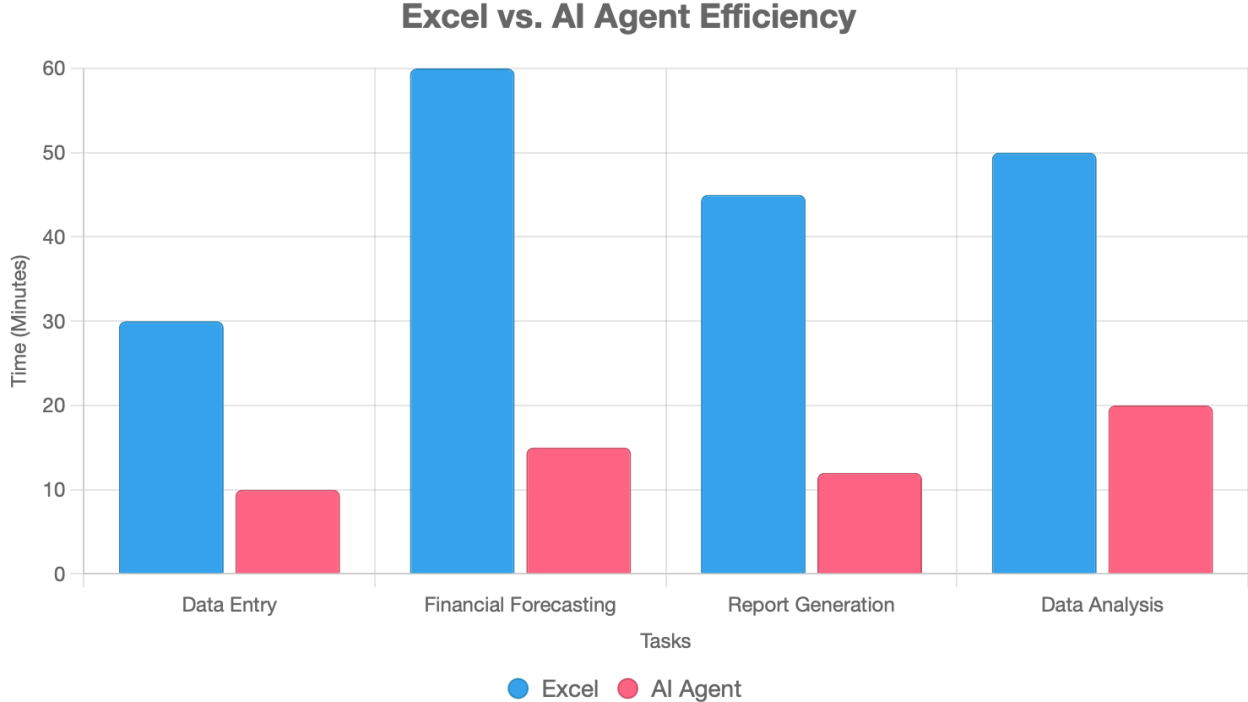For decades, Excel has been the unquestioned backbone of financial modeling, forecasting, and reporting. From small businesses to global enterprises, spreadsheets have shaped how financial professionals analyze data and make critical decisions. Yet, as data grows exponentially and finance workflows become more complex, Excel’s limitations—manual entry, human error, and slow consolidation—are increasingly apparent.
Enter a new generation of AI agents. Launched by former Microsoft executives, these intelligent tools aim to replace traditional spreadsheet workflows with automation, predictive insights, and cloud-based collaboration. These AI agents are not just incremental improvements—they promise a paradigm shift in how finance teams operate.
This article explores how these AI agents work, why they are significant for finance professionals worldwide, and what the shift from Excel means for organizations seeking efficiency, accuracy, and scalability.
The Rise of AI in Modern Finance
Why Excel Alone Is No Longer Enough
Spreadsheets were revolutionary in their time, allowing finance teams to manage data and perform calculations with relative ease. However, in today’s fast-paced financial landscape, Excel’s limitations are increasingly evident:
-
Human error: Studies show that 88% of spreadsheets contain mistakes, from simple miscalculations to complex formula errors.
-
Time-intensive workflows: Monthly reporting cycles often require hours of manual data aggregation, review, and reconciliation.
-
Lack of predictive capability: Excel provides historical data snapshots but cannot anticipate trends, risks, or anomalies automatically.
As finance teams face bigger datasets and faster decision-making requirements, the need for automation and intelligence has never been more urgent.
AI Agents Explained
AI agents are software programs designed to perform specific tasks autonomously while learning from data inputs. In finance, they can:
-
Automate repetitive tasks like reporting, reconciliation, and data consolidation
-
Generate real-time insights and predictive forecasts
-
Detect anomalies, fraud, or inconsistencies automatically
-
Integrate with existing systems such as ERP, CRM, and cloud-based tools
For example, an AI agent can analyze thousands of transactions, identify trends, and generate a complete monthly report without human intervention—a process that could take days using Excel alone.
A multinational investment firm implemented AI agents to handle financial reporting. Within three months, they reduced reporting time by 60%, while human analysts could focus on strategic decision-making instead of manual number-crunching.
How Ex-Microsoft Executives Are Leading the Shift
The founders behind these AI agents bring decades of experience from Microsoft, where they led initiatives in productivity tools, cloud computing, and AI. Their goal is to eliminate the pain points associated with spreadsheet-driven finance while leveraging the scalability and intelligence of AI.
Key strategies include:
-
Cloud-first integration: AI agents are designed to work seamlessly with cloud platforms, allowing real-time collaboration across teams.
-
User-friendly interfaces: Unlike complex Excel macros or formulas, these agents use intuitive dashboards and natural-language commands.
-
Predictive intelligence: Beyond reporting, AI agents forecast trends, highlight risks, and provide actionable recommendations, making finance more proactive than reactive.
By combining their expertise in AI with insights from enterprise workflows, these executives aim to create tools that are both powerful and accessible, bridging the gap between traditional finance and modern automation.
Benefits of AI Agents Over Excel
Efficiency and Accuracy
AI agents can process massive datasets instantly, eliminating human error and ensuring consistent calculations. For finance teams, this translates into faster reporting, fewer mistakes, and reliable data for critical decisions.
Collaboration and Scalability
Unlike static Excel files, AI agents operate in cloud environments, enabling multiple users to access and interact with the same dataset simultaneously. Teams can scale operations without duplicating efforts or relying on manual consolidation.
Cost Implications
Although the initial implementation may require investment, AI agents reduce long-term labor costs and error-correction expenses. Faster decision-making and improved accuracy can directly impact ROI, particularly for large corporations managing complex financial operations.
Pros:
-
Time savings
-
Error reduction
-
Real-time insights
-
Scalability
Cons:
-
Initial adoption cost
-
Learning curve for staff
-
Dependency on AI accuracy
Global Trends Driving AI Adoption in Finance
The adoption of AI in finance is growing worldwide, influenced by digital transformation, regulatory compliance, and the demand for faster insights:
-
Statistics: Deloitte reports that 62% of finance teams plan to increase AI spending by 2026.
-
Regional adoption:
-
US & Europe: Early adopters in investment banking and corporate finance
-
Asia-Pacific: Rapid growth in fintech, corporate finance, and AI-powered analytics
-
-
Regulatory considerations: AI implementations must comply with global privacy laws, including GDPR and CCPA, while ensuring auditability and transparency.
FAQs
Q1: Can AI agents completely replace Excel?
A: Not immediately. While AI can automate complex tasks, Excel still serves basic modeling needs. Over time, AI agents are likely to reduce reliance significantly.
Q2: Are AI agents secure for financial data?
A: Yes. Enterprise-grade AI agents include encryption, compliance with GDPR/CCPA, and detailed audit trails.
Q3: What is the ROI of implementing AI agents in finance?
A: Companies report 40–60% time savings in reporting and analysis, alongside more accurate decision-making.
Q4: How difficult is integration with existing systems?
A: Most AI agents offer APIs and connectors for ERP, CRM, and cloud tools, minimizing integration challenges.
AI agents are poised to redefine finance, offering efficiency, accuracy, and strategic insights beyond what Excel can provide. For CFOs, analysts, and global teams, adopting AI is no longer optional—it’s a competitive necessity.
Future trends:
-
More sophisticated predictive analytics
-
AI collaboration tools for cross-functional finance teams
-
Integration with decentralized finance (DeFi) and blockchain-based systems
Actionable takeaway: Identify repetitive finance tasks that could benefit from AI automation, pilot a small-scale implementation, and train your team for a smooth transition.
Stay ahead of finance AI trends—subscribe for weekly insights and case studies.
Note: All logos, trademarks, and brand names referenced herein remain the property of their respective owners. The content is provided for editorial and informational purposes only. Any AI-generated images are illustrative and do not represent official brand assets.



